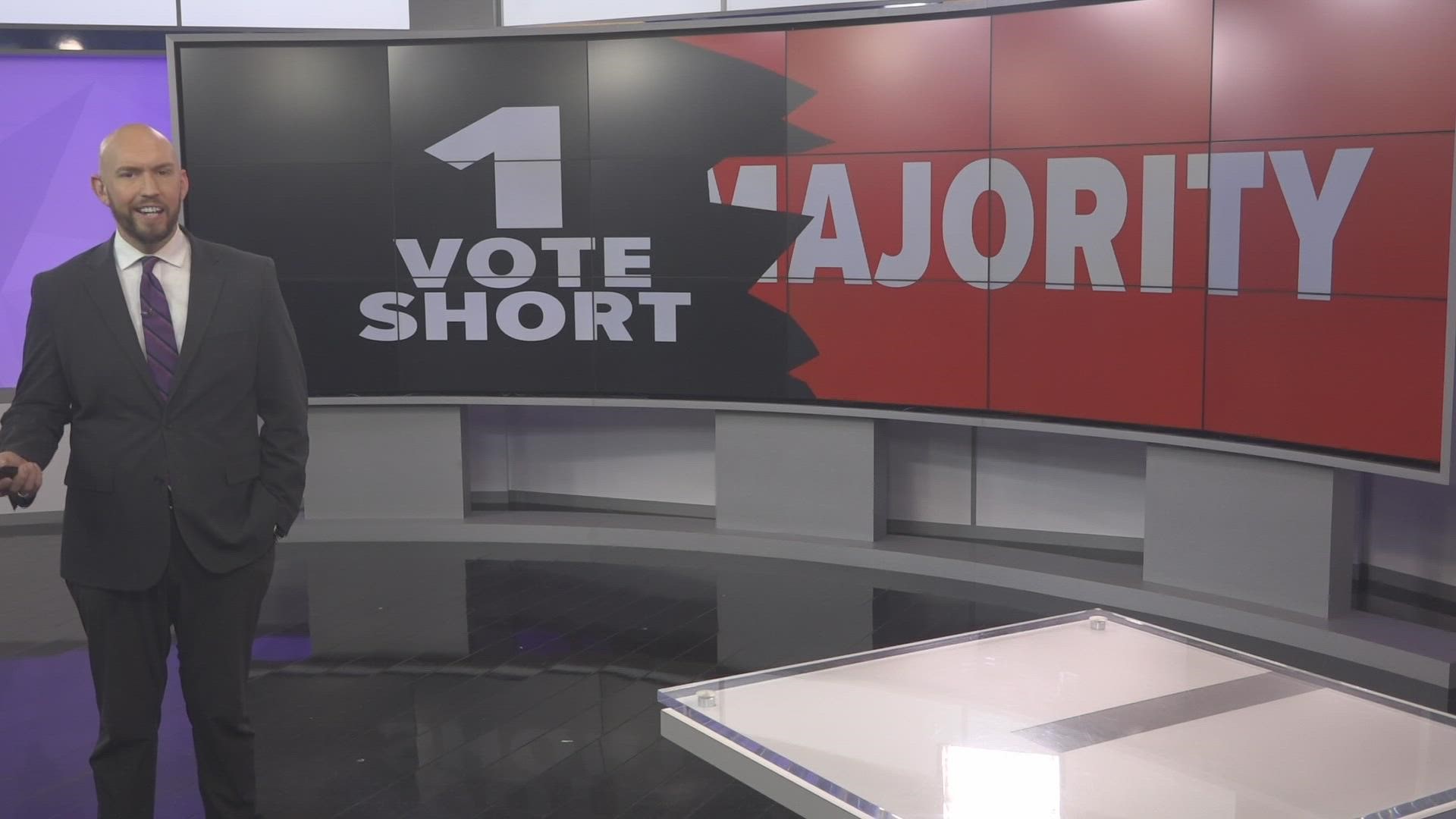GREENSBORO, N.C. — A supermajority means the party has enough votes to override the Governor's veto. North Carolina Republicans won that supermajority in the Senate, but they came up one seat short in the House. However, history shows us there is still a path for Republicans to overturn Cooper's vetoes.
September 11, 2019
After months of stalemate over the budget, House Republicans held a vote on a veto override when most Democrats were not in attendance. To override a veto there has to be a three-fifths majority of members present at the time. If lawmakers stuck to voting along party lines, there would not be enough votes to override the veto when everyone is present. But by holding the vote at that time, Speaker Tim Moore was able to get the veto override passed 55-15.
Video of one of the Democrats on the house floor at the time went viral across the nation:
JUNE 21:
Senate Leader Phil Berger and Speaker Tim Moore showed up at the Executive Mansion with a box of biscuits to talk about the budget. (This is the last reported time they have been in a room with Governor Roy Cooper to talk about the budget in person)
JUNE 28TH:
Cooper vetoed H966, the $24 billion budget act.
JULY 8:
The veto override vote appears on the calendar for the first time. But it does not happen after Moore feels there are not enough votes for an override. Moore has since tweeted that he WOULD HOLD the veto override UNTIL HE HAD THE VOTES.
JULY and AUGUST:
The override vote stays on the calendar, but Moore keeps pushing back the vote. Also, no-vote sessions, or skeleton sessions, have become common leading to the frustration of lots of lawmakers who say it’s tough for them to be at every session. Remember the legislative session is normally over before August. It’s stretched on this year because of the budget battle.
September 10, 4:32 pm – 4:35 pm:
Moore has tweeted that during this afternoon session of the House “the intention to take recorded votes on Wednesday was announced … twice. Shortly after the Chair announced intention to take recorded votes the following day, the Chair announced a session start time of 8:30 a.m. for Wednesday.”
Audio records show Moore’s statement is true. The Chair even asked for “member’s attention” before making the announcement that there would be a vote. It is important to note that it’s not clear if the votes would be taken in the morning or afternoon sessions. The audio only says tomorrow. And the veto override is not included in the list of bills that will be voted on.
September 10, 5:05 pm:
The calendar schedule for September 11 is e-mailed out to lawmakers. It shows there could be a “reconsideration of vetoed bill 2019 Appropriations Act” at 8:30 in the morning. BUT THE POSSIBILITY OF A VETO OVERRIDE VOTE HAS BEEN ON THE CALENDAR 38 TIMES BEFORE THIS.
September 10, 5:05 pm to 11:59:
Sometime during the evening, the office of House Democratic Leader Darren Jackson e-mailed Democratic representatives saying there would be no votes in the morning. (2 Wants To Know has put in multiple requests for a copy of this e-mail. We’re still waiting to find out the exact wording and time it was sent out.). Jackson has said that House Rules Committee Chairman David Lewis told him there would be no votes held in the morning. Lewis counters that he only said he’d try to hold off voting on two other bills until the Democrats had time to caucus Wednesday morning. Lewis says he never told Jackson there would be “no votes” in the morning.
September 11, 8:30 am:
Session is called into order. A prayer is conducted and some other routine business.
September 11, 8:34 am:
The audio recording for House goes silent for a little more than a minute.
September 11, 8:35 am:
Representative John Saine from Lincoln County made a motion for the vote to override the veto. (Within seconds you can hear House Democratic Whip Deb Butler and at least one other Democrat object saying they were told through a public announcement that there would be no votes. Moore says “that was not announced.”
September 11, 8:36 am:
Moore opens the vote. He asks the clerk if the Chair advised there would be no vote. (we can’t hear the answer on the audio). Butler and others can still be heard protesting.
September 11, 8:38 am:
Moore says the Chair confirms that there was no announcement that there will be no votes.
September 11, 8:39 am:
Moore closes the vote and directs the bill to be sent to the Senate.
September 11, 8:37 am:
Speaker Tim Moore calls a vote on the Veto override. It passes 55-15 with 38 democrats and 10 republicans not voting.
The bottom line for 2022
With an even bigger Republican majority than in 2019, if even one Democrat is absent from a session it could open the door to Republicans being able to override the Governor's veto.

